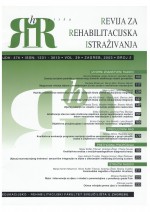Mogućnost vršenja izbora u svakidašnjem životu osoba s mentalnom retardacijom
The Possibilities for Mentally Retarded Persons to Make Their Own Choices in Everyday Life
Author(s): Daniela Bratković, Branko Nikolić, Marija BilićSubject(s): Inclusive Education / Inclusion
Published by: Sveučilište u Zagrebu, Edukacijsko-rehabilitacijski fakultet
Keywords: mental retardation; adults; self-determination; choices;
Summary/Abstract: The individual quality of living depends on one's involvement in controlling everyday life through one's own choices and decisions. Whether persons with mental retardation will use this right mostly depends on the opportunities, encouragement and support they get from others. Due to bad living conditions and insufficient programs for developing choice-making and decision making skills, many mentally retarded persons never had the opportunity to become self-determined in diffirent areas of life- The aim of this research was to detect what differences exist between adults with moderate and severe mental retardation living in institutions (N:50) and those living in families (N:50) from the aspect of making their own choices in everyday life (food' clothing, bedtime, arranging place for living, spending money, work activities, leisure time activities, participating in group activities, going out). The scale for evaluating the possibility mentally retarded persons have in making their own choices (Kishi, G., Teeteuihsigh, 8., Zollers, N., Park-Lee, 5., Meyeri L., 1988; adjusted Bratkovic, D., 1997). The research considered both self-estimation by mentally retarded persons and estimations of other people concerned (institutions staff and family members). A comparison analysis of results was made for both estimation methods.
Journal: Hrvatska revija za rehabilitacijska istrazivanja
- Issue Year: 38/2003
- Issue No: 2
- Page Range: 117-128
- Page Count: 12
- Language: Croatian

